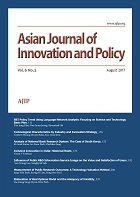The Technology Licensing Office as Factor of Success for Spin-off: Case Study of a Research Lab Startup of Korea
고창룡 (한남대학교)
Abstract
This is a case study to analyze the role of technology licensing or transfer office (TLO) as factors of success for the spin-off from government research lab. The case company is a research lab startup, which is a joint venture through technology investment by a government research lab or university in the designated R&D parks and cash investment by the partner company. The case company listed on the stock market in 2015 reaching a market capitalization of US$ 1.2 billion. We confirm the success factors of startups pointed out in many studies: original technology, good understanding of core technology and production technology, technological competitiveness in the market. However, there is an important factor not well discussed in the previous studies, the role of TLO. TLO guided the company ownership, management, technology, and solved problems that pause business itself. The case became the sample of research lab startup and technology investment in Korea.
- keywords
- Technology commercialization, technology licensing office, TLO, research lab startup, spin-off, success factors
참고문헌
Bae, Y.G. (2013), A Study on National R&D, Technology and Commercialization, Ph.D. Dissertation, Graduate School of Daejeon University.
Bigliardi, B., Galati, F., Marolla, G., and Verbano, C. (2015), Factors affecting technology transfer offices' performance in the Italian food context, Technology Analysis and Strategic Management, 27(4), 361-384.
Boni, A.A., and Thomas E.S. (2005), An integrated model of university technology commercialization and entrepreneurship education, advances in the study of entrepreneurship, Innovation and Economic Growth, 16, 241-274.
Choi, J.I., Hong, G.P., Jang, S.K., and Bae, Y.K. (2012), Technology commercialization of research institute company: a case of the KAERI’s HemoHim, Asia-Pacific Journal of Business Venturing and Entrepreneurship, 7(2), 129-140.
Conti, A., and Gaule, P. (2011), Is the US outperforming Europe in university technology licensing? a new perspective on the European paradox, Research Policy, 40 (1), 123-135.
Cung, G.O. (2004), An Exploratory Study on the Success Factors of Research-based Spin-off Venture across Stages of Growth: Pertaining to Theoretical and Case Study, Ph.D. Dissertation, Graduate School of Hannam University.
Debackere, K., and Veugelers, R. (2005), The role of academic technology transfer organizations in improving industry-science links, Research Policy, 34(3), 321-342.
Ham, H.U. (2016), A Case Study of Successful Spin-off by Public Research Institute: KolmaBNH Co., LTD., Master Thesis, Graduate School of Hannam University.
Hayter, C.S. (2016), A trajectory of early-stage spinoff success: the role of knowledge intermediaries within an entrepreneurial university ecosystem, Small Business Economics, Online First: 21 June 2016, 1-24.
Innopolis Foundation (2015), Spin-off by PRI Guidebook, Daejeon: Innopolis Foundation.
Kim H.M. (2014), A Study on The Effect of Commercialization Support of Public Research Institute on Commercialization Factor, Graduate School of Korea Univ.
Kim, C.H., and Ko, C.R. (2014), Success and failure factors of technology commerciali- zation: a Korean case, Asian Journal of Innovation and Policy, 3(1), 25-49.
Kim, C.H., Ko, C.R., and Seol, S.S. (2012), Case studies on the success and failures of commercialization of technology, Korea Technology Innovation Society, 15(1), 203-223.
La, K.H. (2015), Technology Commercialization strategy of Innopolis, Support policy workshops to strengthen the capacity Jeonbuk Intellectual Property.
Lee T.J. (1998), Spin-off strategies of the improvement of the performance national nuclear R&D project, Korea Technology Innovation Society, 1(2), 208-219.
Lee, G.B. (2016), Factors for Growth Factors of Research Lab Startup, Ph.D. Dissertation, Sungkyunkwan University.
Lee, I.S., Kook, C.P., and Hong, K.H. (2004), A Model for corporate governance of research institutes in the public sector, Sogang Business Journal, 15(2), 249-294.
Lee, S.S. (2014), The study on the impacts of the foundation and management of the Innopolis start-ups focusing on the entrepreneurial intention of researchers, The Korean Society of Business venturing, 9(1), 69-77.
Lee, Y.D. (2010), Technology Commercialization, Seoul: Dunam Press.
Lee, Y.J., Jung, K.C., Jang, B.Y., Kim, S.W., Lee, M.K., Kim, Y.H., Kim, S.K., Jung, W.J., and Lee, S.H. (2012), Vitalization of technology-based startup by inspiring entrepreneurship, Policy Research, 2012 (12), Seoul: Science & Technology Policy Institute.
Leestma, D.C., Krishen, K., and Shepherd Jr., C.C.K. (2013), Innovative approaches to technology transfer and commercialization at NASA Johnson Space Center, AIAA SPACE 2013 Conference and Exposition.
Major, J.D. (1988), Some practical intellectual property aspects of technology transfer, International Journal of Technology Management, 3(1-2), 43-50.
Megantz, R.C. (1996), How to License Technologies, New York: John Wiley and Sons.
Nevens, T.M., Summe, G. L., and Uttal, B. (1990), Commercializing technology: what the best companies do, Harvard Business Review, 1990(5-6), 134-147.
OECD (2001), Generating spin-offs: evidence from across the OECD, STI(Science Technology Industry) Review, 26, 13-55
Park, H.W., Cho, S.B., and Seol, S.S. (2013), Technology Commercialization, Seoul: Korea Valuation Association.
Park, J.B. (2008), Status and challenges of technology commercialization in Korea - focusing on public Technology, Seoul: Korea Institute for Industrial Economics & Trades.
Roessner, D. (2000), Quantitative and qualitative methods and measures in the evaluation of research, Research Evaluation, 9(2), 125-132.
Seol, S.S. (2000, 2009, 2015) Valuation of technology, training material for Korea certified valuation analysts, Seoul: Korea Valuation Association.
Seol, S.S. (2013), Technological Innovation, Seoul: Bobmunsa.
Seol, S.S., and Lee, K.H. (2002), A study on checklists for technology, market and firm analysis, Korea Technology Innovation Society, 5(3), 277-292.
Seol, S.S., Oh, S.G., and Park, H.W. (2012), Technology Valuation, Bobmunsa: Seoul.
Slaughter, S., and Leslie, L.L. (1997), Academic Capitalism: Politics, Policies, and the Entrepreneurial University, Johns Hopkins University Press.
Tseng, A.A., and Raudensky, M. (2014), Performance evaluations of technology transfer offices of major US research universities, Journal of Technology Management and Innovation, 9(1), 93-102.
Wu, Y., Welch, E.W., and Huang, W.L. (2015), Commercialization of university inventions: individual and institutional factors affecting licensing of university patents, Technovation, 36-37, 12-25.
- 다운로드 수
- 조회수
- 0KCI 피인용수
- 0WOS 피인용수


